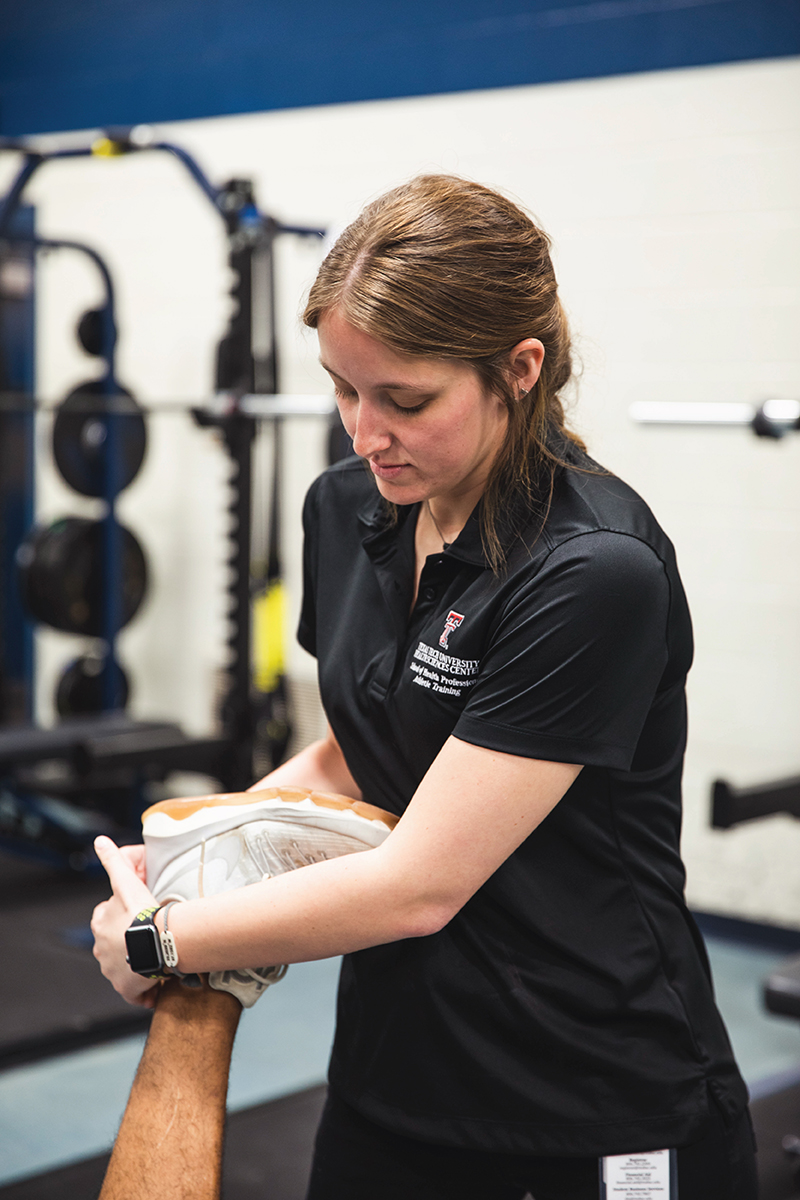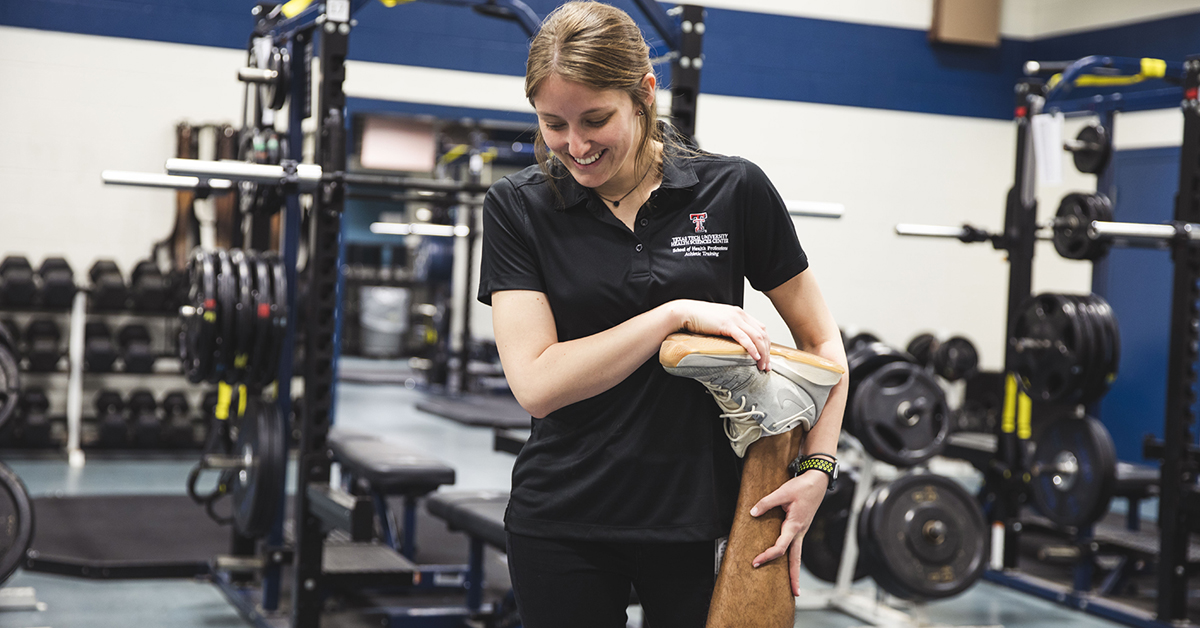What Does an Athletic Trainer Do?

As the job title suggests, an athletic trainer will often be found on the sidelines of a sports field or working with athletes to help protect them from injury and improve their athletic performance. However, the world of sports is just one arena where you will find these versatile health care professionals at work.
As the program director for the Master of Athletic Training program at Texas Tech University Health Sciences Center School of Health Professions (TTUHSC SHP), Professor Leslee Taylor helps students plan for and build their athletic training careers across many different areas of practice.
“It's not just sport,” says Taylor. “That's where the profession started but it has grown so much over the years. Some athletic trainers work in the typical practice settings like colleges and professional sports but there are also athletic trainers who practice their athletic training skills in the military, in the performing arts, in occupational health, in public safety, in the physician practice setting, and in health care administration. There really is a huge variety of opportunities for athletic trainers in terms of who they work with and what the specific focus of those different settings would bring.”
Athletic Training Skills
Regardless of their chosen area of practice, there is a common thread that runs throughout the health care careers of all athletic trainers
“Athletic trainers are involved in a continuum of care for a physically active patient population,” says Taylor. “This will typically involve the prevention and evaluation of injury, rehabilitation, and return to activity along the entire continuum, or pieces of that continuum, depending on where the athletic trainer is practicing.”
Talyor explains that athletic trainers work with patients to address problems across a wide range of issues.
“We see everything from emergent and urgent orthopedic conditions affecting the ankles, knees, lower back, cervical, shoulder, and elbow, to the non-orthopedic, such as skin conditions and even the common cold,” says Taylor. “I like to think of it as a combination of orthopedics, primary care, rehabilitation, and strengthening and conditioning.”
Health Care Careers in Athletic Training
So what does an athletic trainer do in the various practice settings outside of the sports environment?
“In the performing arts, you’ll find companies like Cirque du Soleil employing a whole series of athletic trainers and physiotherapists to work with their performers, helping to keep them performance-ready, and recover from injuries when they occur," says Taylor.
Athletic trainers can also reduce work-related injuries and improve employee efficiency in the workplace, for instance, at a company such as Boeing.
"The athletic trainers at Boeing will get up into the hull of an airplane with the worker and figure out how they can be more efficient and decrease stress on a joint that maybe they are having some repetitive issues with,” Taylor says.
NASA even employs athletic trainers to work with its astronauts on strengthening and conditioning before, during, and after their space missions.
“The athletic trainers at NASA will work on designing zero gravity exercise routines for the astronauts to do while they are in space,” says Taylor. “They will also have various touchpoints with them while they are on a mission to see how they are doing.”

Exposure to Different Practice Settings
Due to the variety of practice settings where an athletic trainer can find employment, the TTUHSC SHP master’s program strives to expose students to as wide a range of scenarios as possible.
“All of our students in the program will see college athletics, secondary school, and most of them will either see a physician practice office and/or an out-patient rehabilitation clinic,” Taylor explains “If somebody really wants to do something in an area like performing arts and we don't have that available here in Lubbock, Texas, we'll work with them to try to identify where that might be and help them secure that immersive experience.”
Learn More
To learn more about where a career as an athletic trainer might take you, or to speak with a faculty member about enrolling in the Master of Athletic Training program at TTUHSC SHP, please visit the program page on our website.
Related Stories
Celebrating Veterans: TTUHSC’s General Martin Clay’s Legacy of Service and Leadership
From his initial enlistment in the Army National Guard 36 years ago to his leadership in military and civilian health care management roles, Major General Martin Clay’s career has been shaped by adaptability, mission focus and service to others.
Texas Tech University Health Sciences Center School of Nursing Named Best Accelerated Bachelor of Science in Nursing Program in Texas
The TTUHSC School of Nursing Accelerated Bachelor of Science in Nursing (BSN) program has been ranked the No. 1 accelerated nursing program in Texas by RegisteredNursing.org.
TTUHSC Names New Regional Dean for the School of Nursing
Louise Rice, DNP, RN, has been named regional dean of the TTUHSC School of Nursing on the Amarillo campus.
Recent Stories
The John Wayne Cancer Foundation Surgical Oncology Fellowship Program at Texas Tech University Health Sciences Center Announced
TTUHSC is collaborating with the John Wayne Cancer Foundation and has established the Big Cure Endowment, which supports the university’s efforts to reduce cancer incidence and increase survivability of people in rural and underserved areas.
TTUHSC Receives $1 Million Gift from Amarillo National Bank to Expand and Enhance Pediatric Care in the Panhandle
TTUHSC School of Medicine leaders accepted a $1 million philanthropic gift from Amarillo National Bank on Tuesday (Feb. 10), marking a transformational investment in pediatric care for the Texas Panhandle.
Texas Tech University Health Sciences Center Permian Basin Announces Pediatric Residency Program Gift
TTUHSC Permian Basin, along with the Permian Strategic Partnership and the Scharbauer Foundation, Feb. 5 announced a gift that will fund a new pediatric residency.
